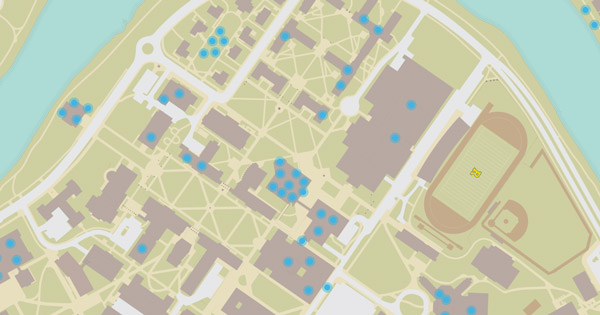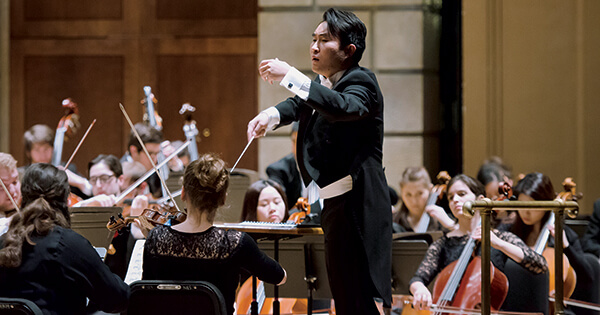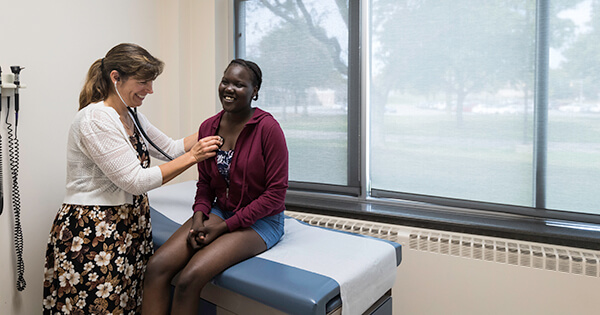Caring for our community’s children
Caring for our community’s children at the
Levine Autism Clinic
One of eight programs within URMC’s Division of Developmental and Behavioral Pediatrics (DBP), the William and Mildred Levine Autism Clinic recently reached its first anniversary. With the opening of this thoughtfully designed facility, DBP consolidated its services into one location. This single patient center allows for more comprehensive care of children and families, as well as a multi-disciplinary approach to training, research, and clinical services.
Upon entering the fully accessible, sensory calming space, it is apparent that this truly unique state-of-the-art facility was built with love and care. But the stories of the health care providers, staff, researchers, families, and children are what really bring to light the features that make this space special. With the support of generous donors in the community, and investment from the Medical Center, in one short year the Levine Autism Clinic has become something to celebrate.
Receiving life-changing treatment
 Karen & Reese Marzano
Karen & Reese Marzano
Parent and Patient
Autism has been a part of Karen Marzano’s life since her daughter Reese was diagnosed as autistic at just two years old. But it wasn’t until September 2017, nearly 10 years after her initial diagnosis, that Reese began utilizing the services and care available at the Levine Autism Clinic.
Last year, as summer came to an end, Reese experienced severe anxiety that affected her behavior and quality of life, Marzano says. After seeking the advice of Lisa Latten, a family navigator at the clinic, Reese began seeing Dr. Susan Hyman almost immediately. “Thanks to Dr. Hyman, Reese is getting back on track to who she was before,” she says. “Without Lisa’s guidance, and Dr. Hyman’s care, she would still be in crisis.”
The clinic’s collaborative care environment, coupled with its intentional design, promotes a familiar and comfortable environment for children with autism and behavioral disorders, according to Marzano. “The dim lighting, the quiet rooms, the attention to the sensory experience—these are small things, but they make a huge difference for patients like Reese,” she says.
Integrating research and care
 Laura Silverman, PhD
Laura Silverman, PhD
Associate Professor of Pediatrics
Brenna Cavanaugh, PsyD
Instructor of Pediatrics
Dr. Laura Silverman and Dr. Brenna Cavanaugh get to see the impact of their research firsthand at the Levine Autism Clinic. Silverman and Cavanaugh, along with their colleagues, use coaching to help parents understand and manage their children’s challenging behaviors at home. This type of treatment was created through collaborative research studies done at the University of Rochester and other universities, but is unique in how quickly it has been implemented for use, thanks in large part to the clinic.
“The fact that we’ve been able to take this therapy, modify it, and move it from a controlled research trial to a clinical setting almost immediately is very uncommon,” says Silverman. The original study focused solely on children with autism, but due to the diverse diagnoses within the clinic, the team has been able to adapt their intervention for families with children who have Down Syndrome and other developmental disabilities.
The new space has allowed more parents to attend these training sessions by offering services like the childcare room, and tailored spaces to keep children occupied and relaxed, according to Cavanaugh. “The space provides so many resources and care within close proximity to other specialists,” she says. “We can more easily mentor one another and collaborate across disciplines, creating a better experience for patients and families.”
Supporting families through change
 Lisa Latten
Lisa Latten
Family Navigator
As a family navigator, Lisa Latten plays a unique role at the Levine Autism Clinic, acting as liaison between the clinic’s doctors, nurses, psychologists, and families, and offering guidance for parents as they try to understand difficult diagnoses. For families who visit the clinic, there is no better resource than family navigators like Latten. All of the clinic’s family navigators have some connection to a child with developmental disabilities and can relate to these parents in a special way.
According to Latten, one of the biggest challenges families face is adapting to a new situation and the unfamiliar terminology that comes with it. “A lot of families aren’t sure where to start after a diagnosis, they have questions and need support, and that’s what we’re here for,” she says. “When my son was diagnosed in 2007, I needed someone like me, so I’m glad I can be that resource for someone else.”
Family navigators occupy their own space next to the clinic’s waiting area to meet with children and their parents, something Latten says makes a difference in how they counsel families. “Much like the entire facility, it’s a welcoming area that’s child-centered and visually very calming,” she says. “It’s exactly what we envisioned when we dreamed of a stand-alone clinic to service children with disabilities.”
 Meeting the needs of a community
Meeting the needs of a community
Lynn Cole, PNP
Director of Clinical Services
Susan Hyman, MD
Division Chief, Developmental and Behavioral Pediatrics
In just one year, the Levine Autism Clinic has provided countless benefits to the Rochester community, and, according to Lynn Cole, PNP and Dr. Susan Hyman, it has also sent a very powerful message. “The University of Rochester has made a commitment to people with developmental and behavioral disabilities,” says Hyman. “It knows to provide the best care, our spaces must reflect the needs of our patients.”
Both Hyman and Cole have observed the clinic’s positive impact on patients and families firsthand. “The facility has been designed intentionally for the services being provided—feeding therapy rooms that look like kitchens, behavioral rooms that minimize distraction, and exam rooms that ensure patient safety,” says Cole.
The clinic is also co-located with psychiatry and neurology services for children and youth, allowing for more cross-functional collaboration and a comprehensive approach to care. Ultimately, it is about creating a setting that yields the best outcomes for our patients, says Hyman. “Our parents need support, our adolescents need quiet space, and the patients we serve need to feel comfortable,” she says. “It’s a respectful space, and it’s doing exactly what we hoped it would.”
Create a lasting impact
To learn more about the Levine Autism Clinic’s role in the community, and how you can support these efforts, contact Scott Rasmussen, Senior Assistant Vice President for Advancement for Golisano Children’s Hospital, at (585) 273-5932. You can also make a gift here.
—Meghan Goff, June 2018









